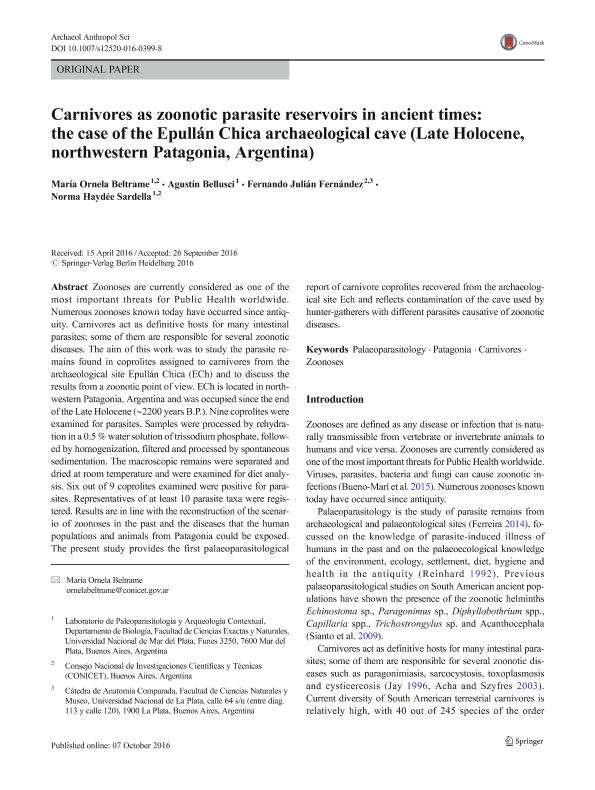Mostrar el registro sencillo del ítem
dc.contributor.author
Beltrame, Maria Ornela

dc.contributor.author
Bellusci, Agustín
dc.contributor.author
Fernández, Fernando Julián

dc.contributor.author
Sardella, Norma Haydee

dc.date.available
2018-08-09T19:42:47Z
dc.date.issued
2018-06
dc.identifier.citation
Beltrame, Maria Ornela; Bellusci, Agustín; Fernández, Fernando Julián; Sardella, Norma Haydee; Carnivores as zoonotic parasite reservoirs in ancient times: the case of the Epullán Chica archaeological cave (Late Holocene, northwestern Patagonia, Argentina); Springer Verlag Berlín; Archaeological and Anthropological Sciences; 10; 4; 6-2018; 795-804
dc.identifier.issn
1866-9565
dc.identifier.uri
http://hdl.handle.net/11336/54846
dc.description.abstract
Zoonoses are currently considered as one of the most important threats for Public Health worldwide. Numerous zoonoses known today have occurred since antiquity. Carnivores act as definitive hosts for many intestinal parasites; some of them are responsible for several zoonotic diseases. The aim of this work was to study the parasite remains found in coprolites assigned to carnivores from the archaeological site Epullán Chica (ECh) and to discuss the results from a zoonotic point of view. ECh is located in northwestern Patagonia, Argentina and was occupied since the end of the Late Holocene (∼2200 years B.P.). Nine coprolites were examined for parasites. Samples were processed by rehydration in a 0.5 % water solution of trissodium phosphate, followed by homogenization, filtered and processed by spontaneous sedimentation. The macroscopic remains were separated and dried at room temperature and were examined for diet analysis. Six out of 9 coprolites examined were positive for parasites. Representatives of at least 10 parasite taxa were registered. Results are in line with the reconstruction of the scenario of zoonoses in the past and the diseases that the human populations and animals from Patagonia could be exposed. The present study provides the first palaeoparasitological report of carnivore coprolites recovered from the archaeological site Ech and reflects contamination of the cave used by hunter-gatherers with different parasites causative of zoonotic diseases.
dc.format
application/pdf
dc.language.iso
eng
dc.publisher
Springer Verlag Berlín

dc.rights
info:eu-repo/semantics/openAccess
dc.rights.uri
https://creativecommons.org/licenses/by-nc-sa/2.5/ar/
dc.subject
Carnivores
dc.subject
Palaeoparasitology
dc.subject
Patagonia
dc.subject
Zoonoses
dc.subject.classification
Historia

dc.subject.classification
Historia y Arqueología

dc.subject.classification
HUMANIDADES

dc.title
Carnivores as zoonotic parasite reservoirs in ancient times: the case of the Epullán Chica archaeological cave (Late Holocene, northwestern Patagonia, Argentina)
dc.type
info:eu-repo/semantics/article
dc.type
info:ar-repo/semantics/artículo
dc.type
info:eu-repo/semantics/publishedVersion
dc.date.updated
2018-08-09T15:21:45Z
dc.journal.volume
10
dc.journal.number
4
dc.journal.pagination
795-804
dc.journal.pais
Alemania

dc.journal.ciudad
Berlin
dc.description.fil
Fil: Beltrame, Maria Ornela. Consejo Nacional de Investigaciones Científicas y Técnicas; Argentina. Universidad Nacional de Mar del Plata. Facultad de Ciencias Exactas y Naturales. Departamento de Biología; Argentina
dc.description.fil
Fil: Bellusci, Agustín. Universidad Nacional de Mar del Plata. Facultad de Ciencias Exactas y Naturales. Departamento de Biología; Argentina
dc.description.fil
Fil: Fernández, Fernando Julián. Consejo Nacional de Investigaciones Científicas y Técnicas; Argentina. Universidad Nacional de La Plata. Facultad de Cienicas Naturales y Museo. Laboratorio de Anatomía Comparada; Argentina
dc.description.fil
Fil: Sardella, Norma Haydee. Consejo Nacional de Investigaciones Científicas y Técnicas; Argentina. Universidad Nacional de Mar del Plata. Facultad de Ciencias Exactas y Naturales. Departamento de Biología; Argentina
dc.journal.title
Archaeological and Anthropological Sciences
dc.relation.alternativeid
info:eu-repo/semantics/altIdentifier/doi/https://dx.doi.org/10.1007/s12520-016-0399-8
dc.relation.alternativeid
info:eu-repo/semantics/altIdentifier/url/https://link.springer.com/article/10.1007%2Fs12520-016-0399-8
Archivos asociados
